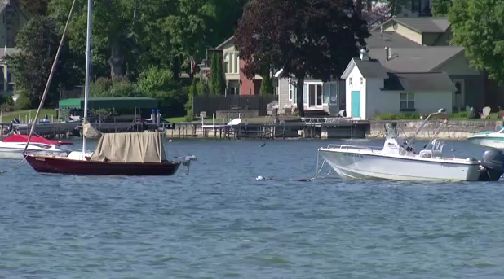It's cooler by the lake — we certainly hear that often this time of year. Ever wonder why that is?
Well put simply, all our beautiful lakes this time of year are cold after a long winter. If you are enjoying a nice sunny, warm calm day, then the temperature drops 20 degrees as a breeze swings in from the lake, we call that a lake breeze. You can blame the specific heat as to why that occurs. Specific heat is defined by the amount of energy required to raise a unit of mass of a substance by a degree. For our purposes it is how much heat energy it takes to raise the same amount of water as it does land.
That is the scientific reason a lake breeze occurs. It is due to the difference in specific heat between two substances. In our weather, the two substances we are referring to are land and water.
The specific heat of water is higher than any other common substance on Earth. In other words it takes a lot of energy to heat water. The specific heat of land is much lower than water. It varies a little by soil type, but it takes a lot less energy to raise the temperature of the same amount of land as water.
Due to the differences between the land and water’s specific heat value, we can have big differences in temperatures on a day to day basis. During a sunny spring day the land can heat up quickly, while a lake has very little day to day change. This difference in temperature causes air to move up and down. Warm air rises, cold air sinks. Due to the continuity of mass of air (it behaves like a fluid), if air is leaving one spot, it has to be replaced. In other words you can’t dig a hole in the air, just like you can’t dig a hole in the water. It has to be replaced by more air, or more water. In essence, that void by the rule of nature, the continuity of mass, it must be filled in.
Due to air flowing just like a liquid, we get wind. That cold spring wind off a lake is caused by the sun heating the land quickly, which warms the air above it. This causes the air to rise. Due to the continuity of mass of air, this rising air must be replaced. This causes a breeze to come from the water to fill that void left by the rising air.
Since there is now air moving off the lake onto land, the air above that layer sinks to fill it. That air then needs to be replaced and it comes from the air that rose up from the land. Which then cools and sinks over the lake. We now have a micro (small) scale circulation — the lake breeze. This lake breeze that develops in the spring can cause a 30 degree difference in temperature over a few miles. It can oscillate back and forth, where you a warm one minute, but cold the next. We see this on a grand scale as well around the globe. Air heats up at the equator rises, moves north and sinks at the colder poles. It’s all part of what makes weather, the unequal heating of the Earth’s surface.
That is why over the next couple of months you will hear us often say, “cooler by the lake.” Then again, as boaters and people who enjoy our beautiful waters know, it is always cooler by the lake.





